Magic stories for children have always captured our imagination. From castles that float in the sky and animals that speak to mysterious forests and cloaks that make you disappear, these tales open doors to worlds where everything feels possible. Yet, behind all the wonder and sparkle, they share valuable lessons about bravery, kindness, and believing in who you are. In this article, we’ll look at why magical stories are so beloved, how they support children’s growth, and ways you can find or create the perfect magical adventure.
Here Are Some Unique Magical Stories for Kids
Ella and the Clockwork Slippers
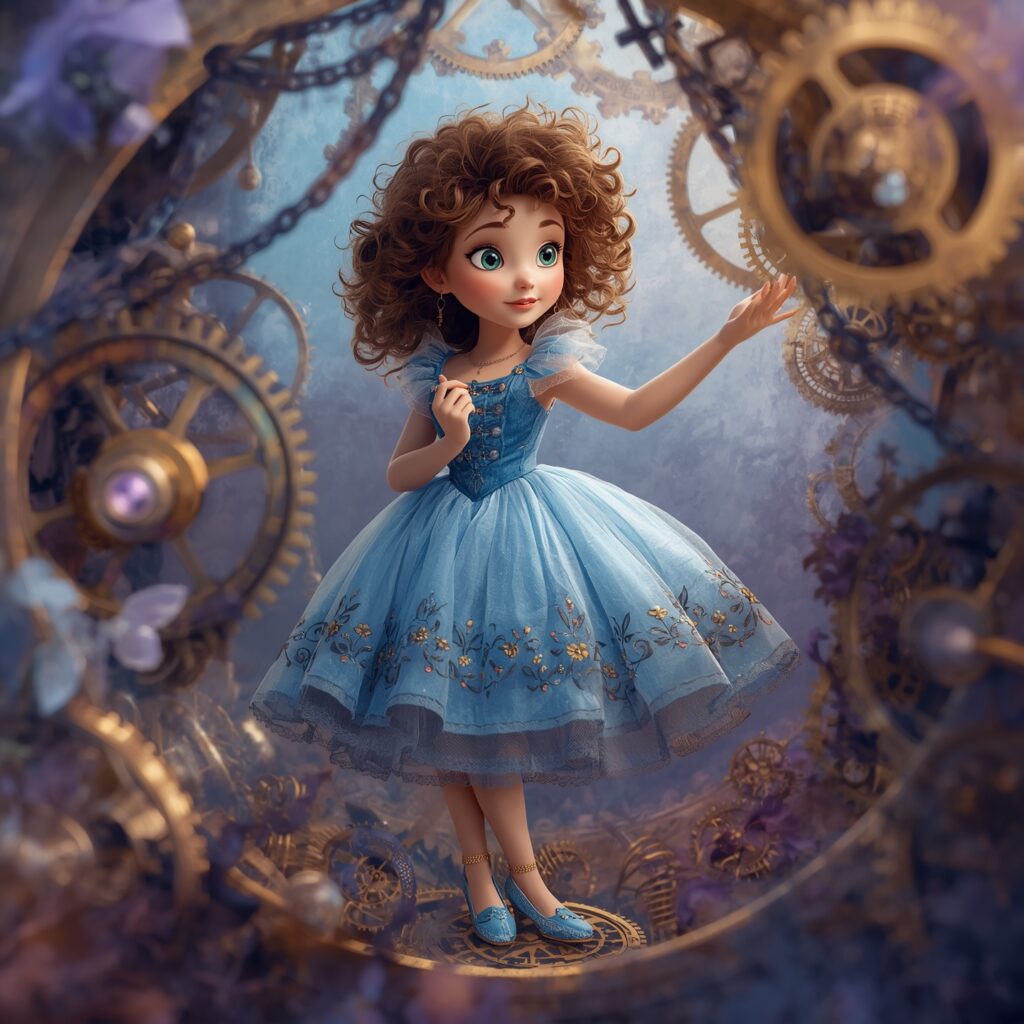
In the kingdom of Gearwin, people valued invention over appearance. Yet Ella’s stepmother, obsessed with looking perfect, banned Ella from working in her late mother’s workshop. Ella spent her nights secretly tinkering with scraps and gears, dreaming of building something special.
One day, a royal invitation arrived: a Grand Science Ball, where the winner would become the Royal Inventor’s Apprentice. Ella was forbidden to go. Heartbroken, she wandered into her mother’s hidden lab and discovered blueprints for “clockwork slippers.” With shaking hands, she assembled the mechanical shoes, which activated with a whisper: “Dance your heart into time.”
When Ella arrived at the ball, her slippers danced on their own, spinning and dazzling the crowd. The prince, an aspiring inventor himself, was amazed not just by her invention, but by her story. As the clock struck midnight, the slippers jammed and sparked, forcing Ella to flee, leaving behind a tiny gear.
The next day, the prince announced a search not for a princess, but for the brilliant mind behind the dancing shoes. When he found Ella, he offered her a place in the royal lab.
Moral: Creativity and kindness outshine beauty.
Jackie and the Moonvine Tree
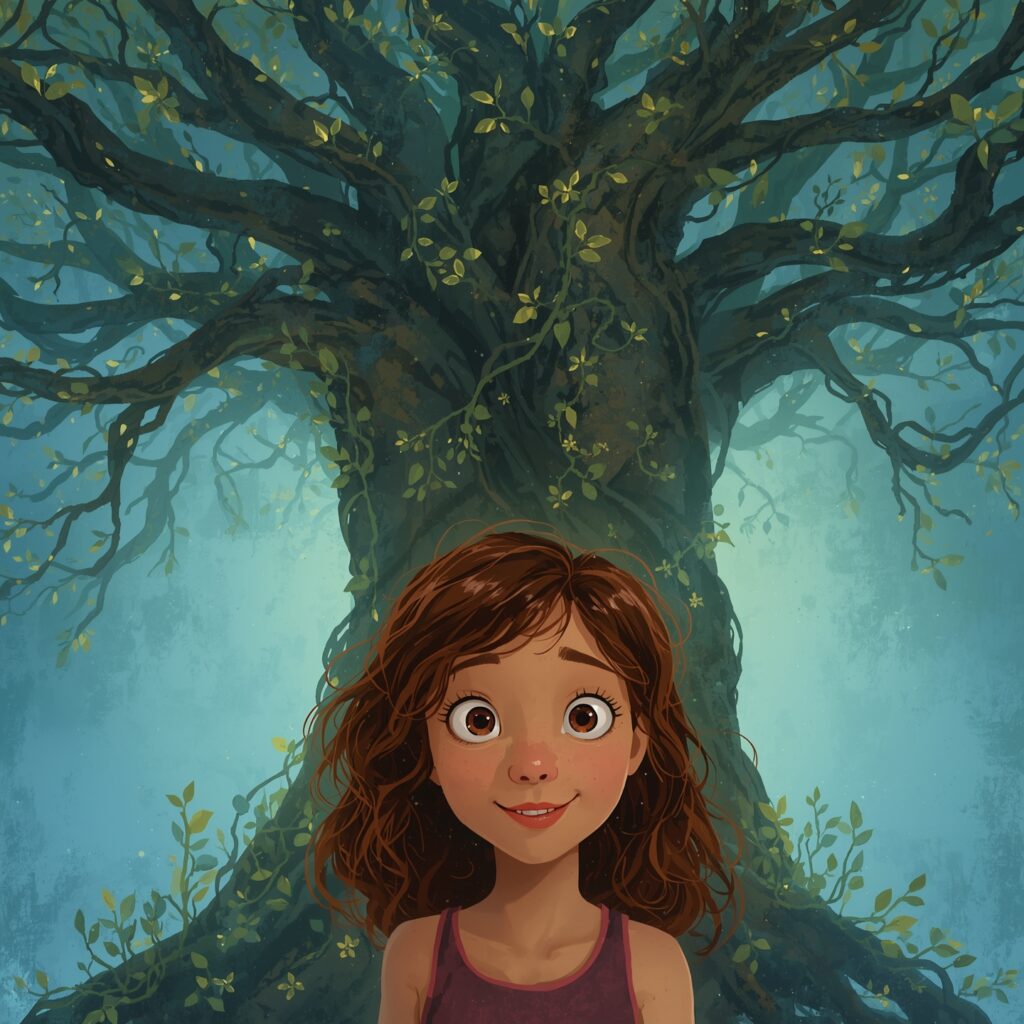
Jackie loved stories about space, but never believed in magic. That changed when an old man at the market offered her a shimmering bean in exchange for her dusty comic book set. She accepted, mostly out of curiosity.
That night, Jackie planted the bean in her garden. By morning, a glowing vine had grown high into the sky. Bravely, she climbed it into the clouds. At the top, she found a floating garden where stars bloomed like flowers, and a gentle giantess tended them alone.
The giantess, once a joyful sky-painter, had grown lonely and stopped painting. The night sky had dimmed. Jackie, with her jokes and stories, made her laugh again. Together, they painted stars back into the sky using brushes made of comet dust.
When it was time to leave, the giantess gave Jackie a glowing moonseed and whispered, “Plant this when someone else needs magic.”
Moral: Compassion can heal even the loneliest hearts.
Rosie and the Singing Mirror
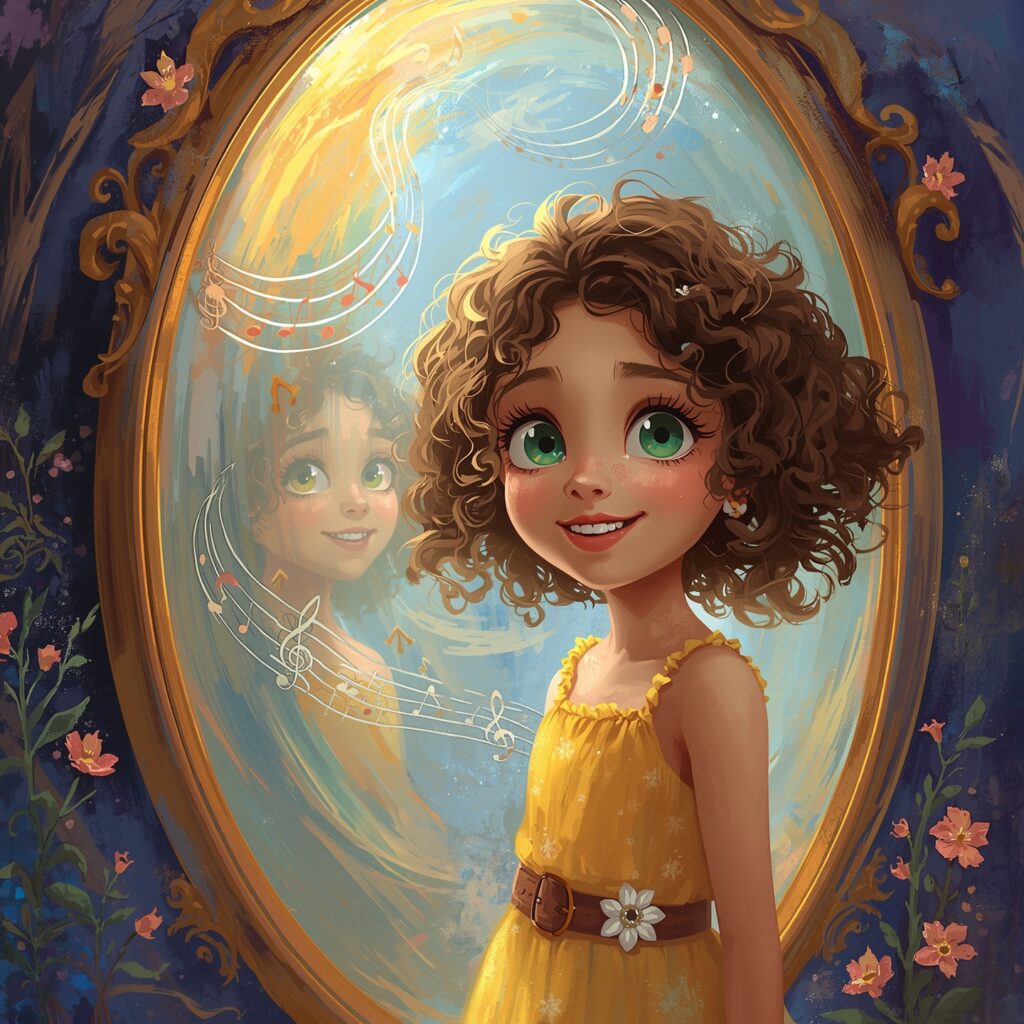
Rosie lived with her stepmother, Madame Velda, a woman who obsessed over beauty. She owned a singing mirror a magical object that whispered secrets and sang truths. One day, it told her, “Rosie will be more admired than you.” Furious, Velda forbade Rosie from ever leaving the house.
But Rosie was curious. Late at night, the mirror began to sing to her too not songs of vanity, but of courage and truth. Rosie discovered it had once belonged to a kind queen who taught that beauty was found in honesty.
When Velda tried to use the mirror to enchant the king and seize power, Rosie sang the truth aloud in front of the royal court. The mirror shattered not from anger, but relief. It had been trapped by lies for years.
Rosie was made Royal Truth keeper a storyteller who used truth to protect the kingdom.
Moral: Honesty is stronger than fear.
The Broomstick Race
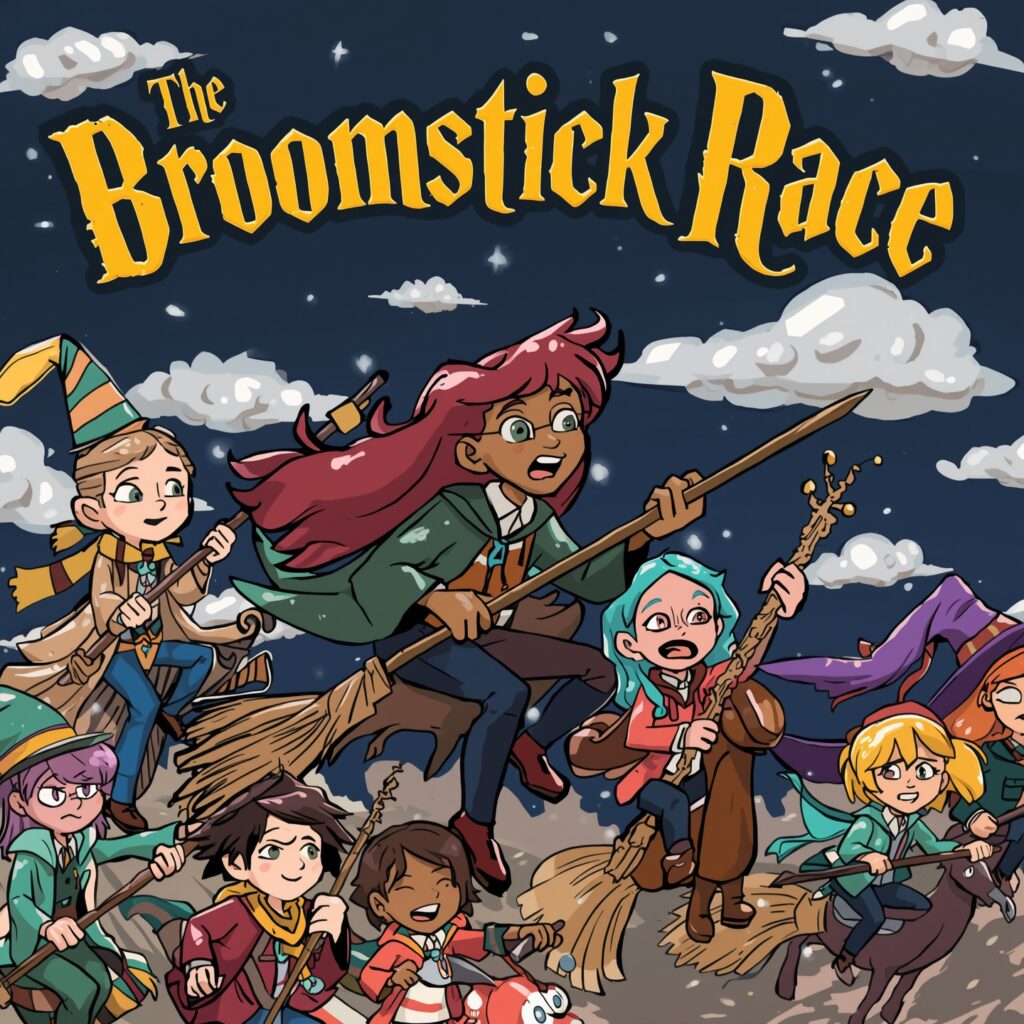
In the flying city of Aetheria, once a year orphans were invited to the Broomstick Challenge, where the winner would be adopted into a loving family. Mina, quiet and unsure of herself, almost didn’t enter. But she found an old, splintery broom that trembled like it was afraid too.
When the race began, the flashy brooms zoomed ahead. Mina’s broom refused to fly until she whispered gently, “We can do this together.” Slowly, it rose. The broom wasn’t the fastest, but it dodged every trap and solved every riddle because Mina listened and encouraged it.
In the final round, she helped another child whose broom had failed, sacrificing her lead. The judges, moved by her kindness, named her Heart of Aetheria and gave her a family who believed in the same magic she did: love and teamwork.
Moral: Courage grows when you believe in yourself.
The Dragon in the Teacup
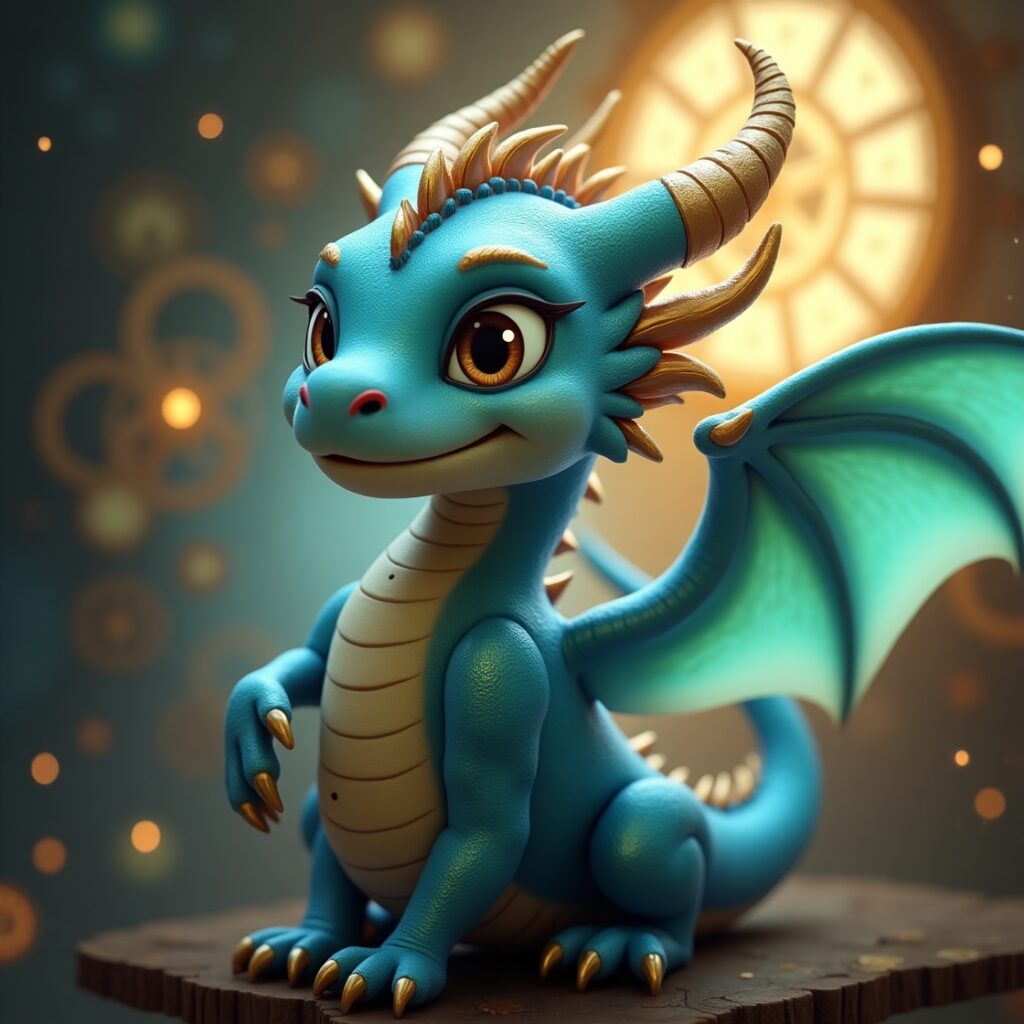
Lila’s grandmother gave her a chipped teacup and told her, “This one holds special warmth.” At first, Lila laughed. But one cold evening, the teacup began to hum, and out flew a tiny green dragon, curling up in her palm.
The dragon, named Pip, explained that he only granted selfless wishes. Lila, tempted to ask for toys and riches, instead wished her sick little brother would feel happy again. Pip blinked, smiled, and flew around their room sprinkling stardust.
The next morning, her brother woke up laughing, and the whole house filled with light and music. Pip winked at Lila and vanished leaving behind a glowing scale in the teacup and a note: “Real magic starts with kindness.”
Moral: True magic lies in kindness.
The Three Enchanted Socks

Tom was always losing his socks until he found a mysterious box at the village fair labeled “For feet that dream.” Inside were three mismatched socks: one red, one silver, and one blue. The seller warned, “Each sock grants a gift—but only for the good-hearted.”
At home, Tom tried the red sock. It gave him super speed, helping him deliver groceries around town. The silver sock made him invisible, and he used it to stop a bully from stealing candy from a little boy. The final blue sock granted super strength, which he used to lift a fallen tree after a storm.
One day, a greedy merchant stole the socks and tried to use them for evil but they stopped working. Why? Because their magic only responded to kindness. The socks flew back to Tom and stitched themselves into a glowing scarf that whispered wisdom.
Moral: Use your gifts for good.
Maya and the Whispering Stars

Maya adored stargazing. One night, her telescope made a click, and a voice whispered: “I am lost. Help me shine again.” Startled, she leaned closer and was pulled into the sky!
She landed in the Kingdom of Stars, where one star named Lior had lost his light. Shadow goblins were stealing star-beams and hiding them in riddles. Maya, with her clever brain and big heart, followed clues across constellations, solving puzzles and restoring the missing pieces.
When the last star lit up, the night sky shimmered brighter than ever. The stars crowned Maya Guardian of the Skies, gifting her a necklace that twinkled each time someone on Earth made a wish.
Moral: Wisdom and heart light the darkest paths.
The Tailor and the Golden Thread
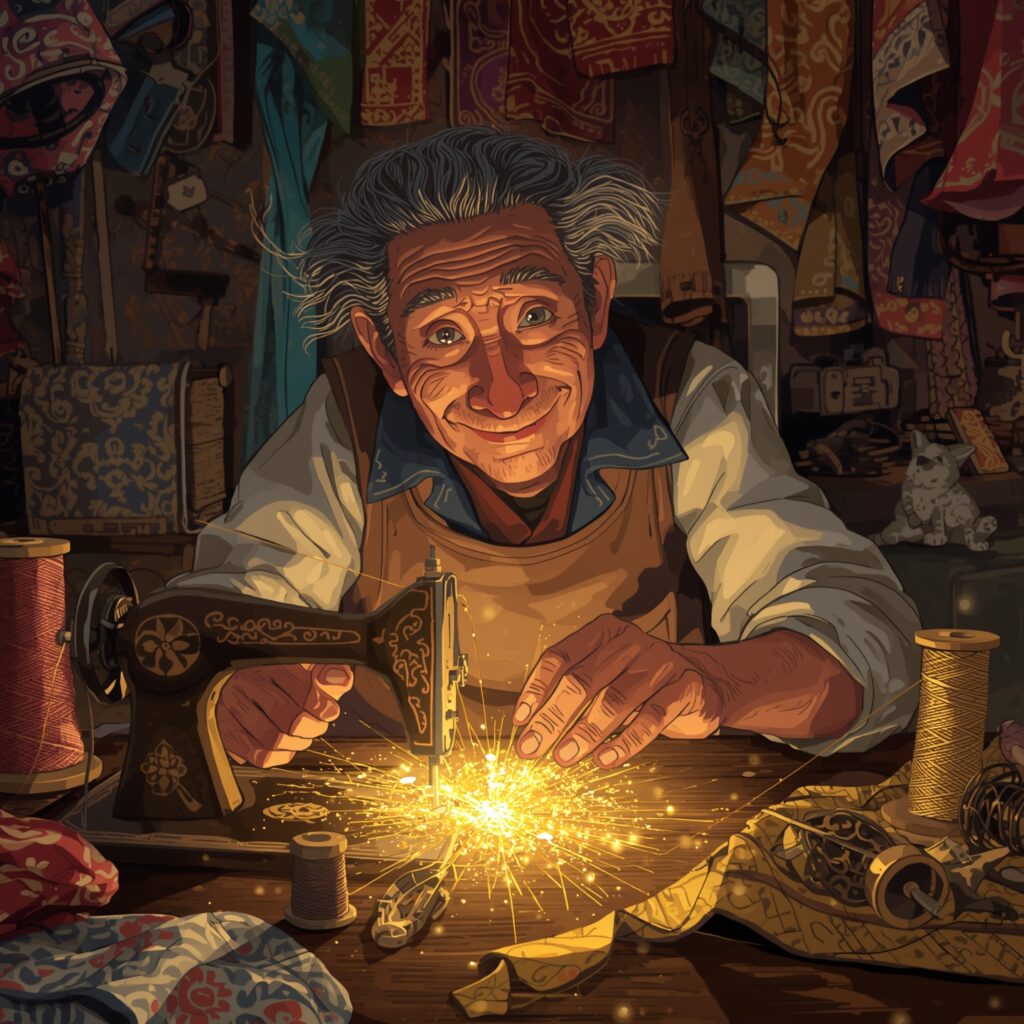
In a humble village, a tailor named Niko sewed magical garments from dreams and moonlight. His favorite thread was golden but he never used it for riches, only to mend the clothes of those who gave thanks.
One day, a vain king demanded a golden robe to impress visiting rulers. Niko agreed but secretly wove the robe with invisible stitches. At the grand banquet, the king wore “nothing” and was laughed at. Furious, he accused Niko of trickery.
Then, a child stood up and said, “I see the robe it’s stitched with thankfulness.” Slowly, the golden robe began to shimmer, visible only to those with grateful hearts.
Ashamed, the king apologized, and from that day on, Niko was known as the Tailor of Truth.
Moral: Pride fades, but gratitude glows.
The Fairy in the Paintbox
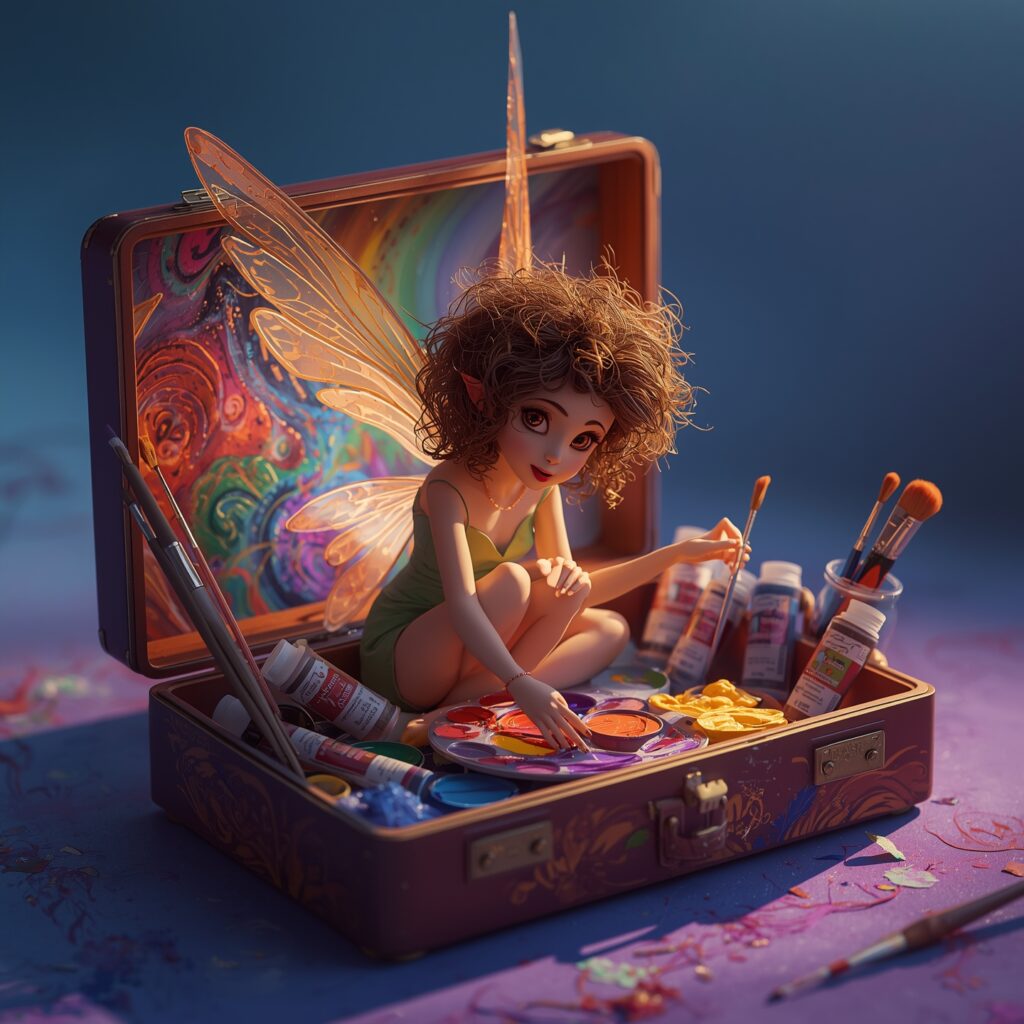
Theo was a shy boy who loved to draw magical creatures. One rainy afternoon, he painted a tiny winged fairy with blue hair and to his shock, she fluttered off the page.
Her name was Tula, and she invited him into her world of colors, where every tree, cloud, and mountain changed based on the painter’s feelings. But danger loomed: a shadow beast called Gloom, born from fear and doubt, had started draining the world’s colors.
With Tula’s help, Theo painted with bravery, using his emotions as paint. Bright oranges for courage, cool blues for calm until Gloom shrank and vanished, replaced by brilliant hues.
Theo returned home, braver than before, his paintbox now glowing and alive.
Moral: Imagination can conquer fear.
Cinderella and the Midnight Library
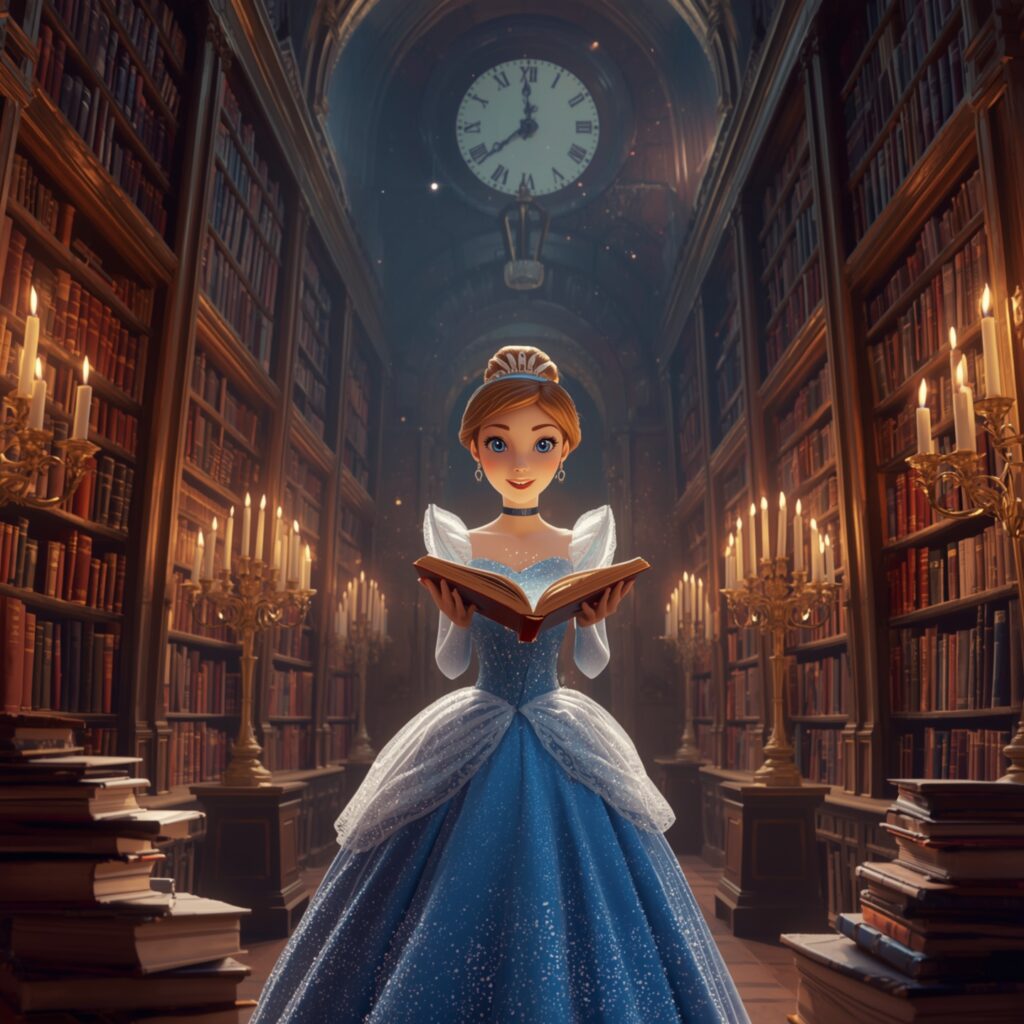
In a quiet village, Cinderella wasn’t just a maid she was a secret reader. Her stepmother burned books, claiming they were “a waste of a girl’s time.” But each night, Cinderella sneaked into the attic to read pages hidden under the floorboards.
One day, a mysterious letter fluttered through the window: “The Royal Midnight Library is open for one night only. Come in secret, come in spirit.”
At midnight, a carriage of pages arrived. Cinderella stepped inside and was taken to a glowing library floating among stars. The shelves whispered stories, and each book she touched gave her magical insight.
There, she met the prince not a swordsman, but a scholar searching for the Guardian of Imagination. Cinderella solved riddles, completed story quests, and passed the final test: writing a tale of her own.
She vanished before morning, but left behind her story. The prince searched for the writer, not by shoe size but by the heart in her words. When he found Cinderella, he made her Head Librarian of the Kingdom.
Moral: Knowledge and imagination are the strongest forms of magic.
Here Are Top 5 LONG STORIES
expand them into 5 longest version magical stories for kids.
Story 1: The Castle in the Clouds
Long ago, in a quiet village, a little girl named Elira often sat on the grass and looked at the sky, where she swore she could see a castle drifting among the clouds. The villagers laughed, saying, “No one can live in the clouds.” But Elira believed anything is possible.

One windy evening, a ladder made of light appeared near the hill where she sat. With trembling steps, she climbed until her head touched the mist. At the top stood a floating castle, its towers made of glass and sunlight. Inside, walls shifted with colors of the sky sometimes pink like dawn, sometimes golden like sunset.
The castle was ruled by Queen Aurelia, who told Elira, “Our world survives on imagination. When children stop dreaming, the castle falls.” Elira was shown a broken wing of the castle where dull gray spread.
Elira’s task was to travel to Earth with a magical harp, playing songs to remind children to dream. For weeks, she sang to lonely kids, sick children, and those who had forgotten hope. Each dream reborn patched the castle until it gleamed once again.
When she finally returned, the castle floated higher than ever, shining so brightly it looked like a second sun. Elira knew then magic wasn’t far away. It lived inside every dreamer.
Story 2: The Parliament of Talking Animals
In a hidden meadow beyond the hills, a boy named Jonas stumbled upon a circle of stones glowing faintly at midnight. When he stepped inside, the world shifted. Suddenly, birds bowed politely, foxes spoke with wisdom, and owls held scrolls under their wings. He had entered the Parliament of Talking Animals.
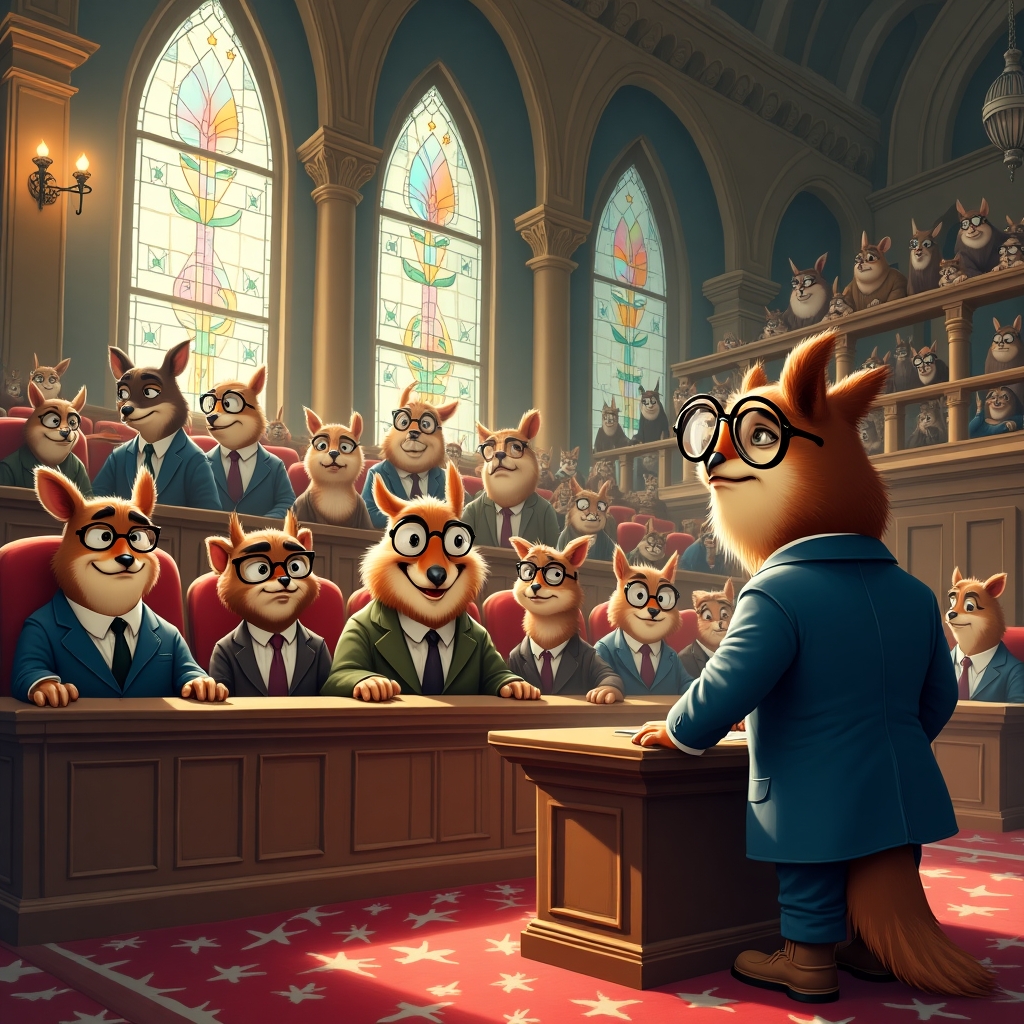
Here, animals ruled with fairness, discussing how to keep balance between nature and humans. Jonas sat beside a bear who offered honeycomb, a rabbit who scribbled laws, and an eagle who debated the stars. They were amazed a child had entered, for no human had been allowed for centuries.
But the animals faced a great threat: humans cutting trees, polluting rivers, and silencing birds. Jonas spoke on behalf of children, promising to teach them kindness. “Whisk kids into worlds,” the eagle said, “for only through stories can they learn to care.”
Jonas was gifted a silver feather that allowed him to hear animals’ voices forever. Back home, he began telling stories to children in his village about what the owl feared, what the fish sang, and what the fox warned. Slowly, children changed how they treated the world.
The Parliament declared Jonas the first “Guardian of Stories,” proving that voices whether bark, chirp, or roar all mattered.
Story 3: Secrets of the Enchanted Forest
A young orphan named Maribel wandered into a dense, whispering forest no villager dared to enter. Legends spoke of trees that moved and rivers that hummed lullabies. To her surprise, the forest welcomed her, paths opening beneath glowing vines.
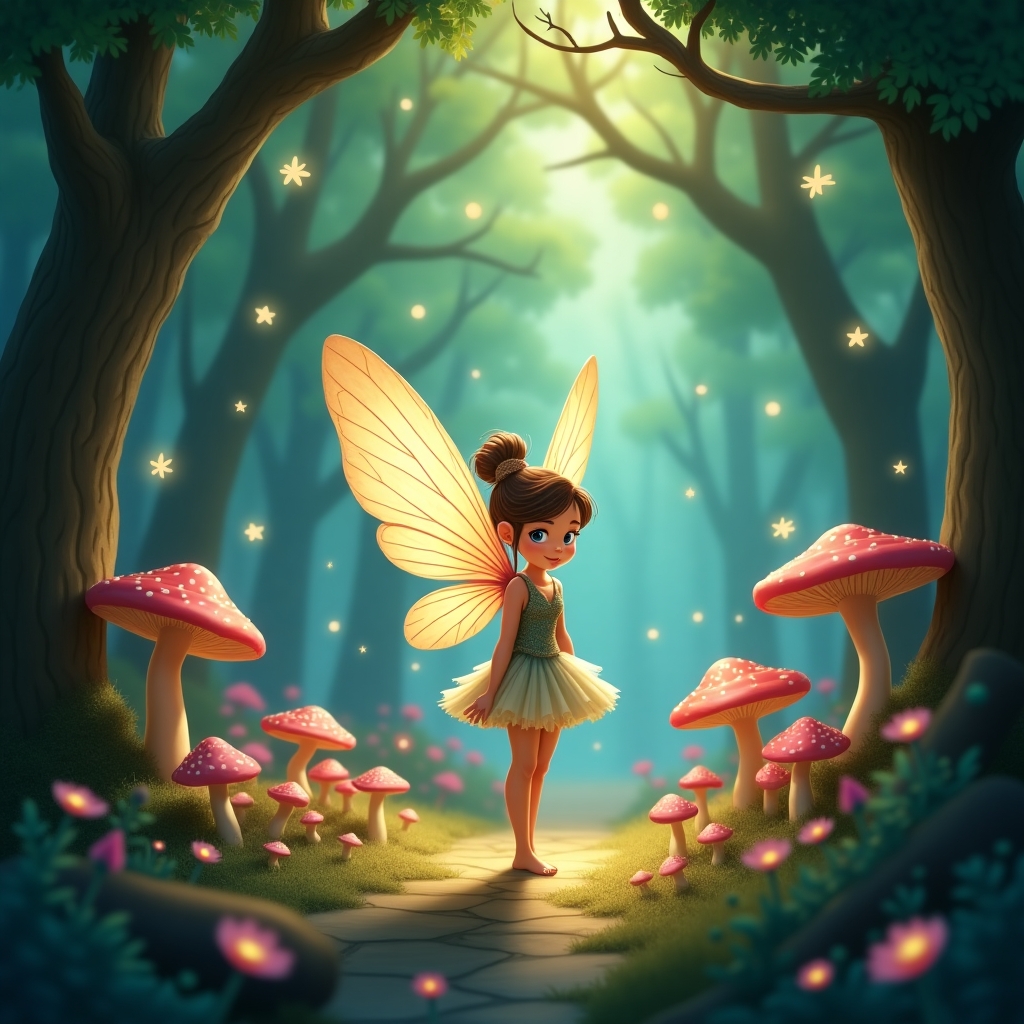
This was the Enchanted Forest, where magic was alive. Fireflies carried lanterns brighter than stars. Rivers bent their currents to guide her. Even the trees whispered secrets: “Follow the silver leaf.”
Maribel followed until she found a giant oak with a hollow door. Inside lived the Forest Keeper, an ancient stag crowned with crystal antlers. He told Maribel the forest was losing magic because humans had forgotten wonder. Without wonder, the forest would wither into silence.
To restore it, Maribel had to gather three lost wonders: a forgotten lullaby, a smile never shared, and a story untold. She ventured far, collecting them through acts of kindness singing to a lonely child, helping a shy girl laugh, and writing a story for her village.
Each wonder she brought back bloomed into golden blossoms across the forest. From then on, children who entered found joy, hope, and courage. Maribel became its protector, proving enchanted places live as long as people believe.
Story 4: The Invisible Cloak of Courage
In a bustling kingdom, a timid boy named Ravi never spoke up, for he feared laughter. One stormy night, an old traveler gifted him an invisible cloak. “Wear it, and no one will see you but only if your heart is pure.”
Ravi tested it the next day and found he could walk unnoticed. At first, he used it for fun, sneaking into kitchens and libraries. But soon he discovered a thief stealing from the market. Using his cloak, Ravi followed and uncovered a gang that threatened the village.
Though afraid, Ravi realized bravery wasn’t about being unseen it was about doing what was right. He revealed the truth, guiding guards to the thieves. His courage inspired others, though no one knew about the cloak.
Years later, Ravi passed on the invisible cloak to a small child who trembled before bullies. Whispering, “This cloak only works when you believe in yourself,” he smiled.
The magic of the cloak was never its fabric, but the courage it awakened.
Story 5: Worlds Beyond the Doorway
Sisters Alia and Mira discovered a hidden doorway behind their attic bookshelf. When opened, it whisked them into worlds beyond imagination.
First, they landed in skies filled with floating castles, guarded by swans with jeweled wings. Next, they ran through enchanted forests where trees played violins and wolves recited poems. Then they visited valleys where talking animals debated philosophy, arguing about stars and rivers.
Each world was magical, yet fragile. A giant book in the Hall of Doors warned: “Every time a child stops believing, a world vanishes.”
The sisters realized that imagination was not just play it was survival for these magical realms. They returned home with a mission: to keep children believing by telling stories. Their bedtime tales were so vivid that other children dreamed of castles, forests, and animals that spoke.
Because of their stories, the magical worlds lived on. And so did the message carved in the Hall of Doors:
“Anything is possible as long as you imagine.”
Conclusion Of Magical Stories
Magical stories are more than just bedtime tales they are doorways to imagination, courage, and wonder. From floating castles in the clouds to talking animals with wisdom, from enchanted forests alive with secrets to invisible cloaks that awaken courage, these stories remind children that anything is possible when they believe.
Each tale carries a gentle lesson to dream without limits, to respect nature and every living voice, to keep curiosity alive, to be brave in the face of fear, and to hold on to the magic of imagination. These stories whisk kids into worlds beyond ordinary life, giving them hope, kindness, and creativity to carry into their own journeys.
✨ Because in the world of stories, anything is possible.
For more stories:
Imagination, Life lessons, anything is possible
In the end, the true magic isn’t in castles, forests, or cloaks it lives within every child’s heart. As long as we tell stories

